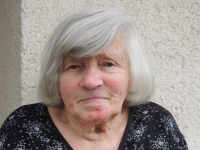Dad earned enough for the rest of his life. Then he lost it all.
Eliška Pečenková, née Němcová, was born on the 25th of January in 1930 in Zubří in the Vsetín area. Her mother, Cecílie, née Randusová, founded the first embroidery workshop in Zubří in around 1920. Her father, Dominik Němec left for Chicago for work in 1913. In the 1920’s, he returned to Czechoslovakia, started a family and intended to live off the … money he brought from America. After the WWII, he lost his possessions, though. Eliška attended basic school in Zubří between 1936 and1944. During the WWII, she witnessed various violent events and air raids during the liberation fights. Between 1949 – 1952, she worked in Gottwaldov as a window dresser for clothes shops. There she met her future husband, Josef Pečenka. In the 1960’s, she got a job as the managing director of the school canteen in Zubří. Due to her worsening health, she got a disability status and retired early. At the time of recording (2021), she and her husband lived in Zubří, in the house her father bought for money he had earned in America.
